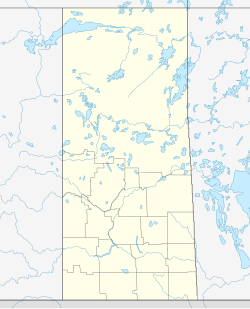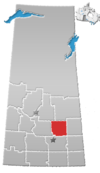Kandahar, Saskatchewan
Kandahar
Candahar Post Office | |
|---|---|
 The road into Kandahar in May 2003 | |
| Coordinates: 51°45′29″N 104°21′43″W / 51.7581°N 104.3619°W | |
| Country | Canada |
| Province | Saskatchewan |
| Rural Municipality | Big Quill |
| Federal Electoral District | Regina—Qu'Appelle |
| Provincial Constituency | Arm River |
| Founded by | Canadian Pacific Railway |
| Named for | Kandahar |
| Government | |
| • Member of the Legislative Assembly | Dana Skoropad, (SP) |
| • Member of Parliament | Andrew Scheer |
| Time zone | UTC−6 (Central Standard Time) |
| [1][2][3] | |
Kandahar is a hamlet in Rural Municipality of Big Quill No. 308, Saskatchewan, Canada. Listed as a designated place by Statistics Canada, the hamlet had a population of 20 in the Canada 2016 Census.[4] Located on Highway 16 near Wynyard, Saskatchewan, the community was named by Canadian Pacific Railway executives in the late 19th century for a British military victory in Kandahar, Afghanistan.[citation needed] The hamlet is too small to be enumerated on its own, so its population belongs to the Rural Municipality of Big Quill No. 308. It is located near the south shore of Big Quill Lake, the largest inland body of salt water in Canada.
History[edit]
Many of the first settlers in the Kandahar district were immigrants from Iceland or of Icelandic descent. A significant number arrived from the Argyle settlement in Manitoba.[5] An Icelandic immigrant, Thorvidur Halldorson (born Þorviður Magnússon), served as the district's first postmaster in 1910. From 1910 to 1913, the spelling of the post office was Candahar. Kandahar became a village in 1913, following a petition from its inhabitants. In 1925, Kandahar was listed as a Canadian Pacific Railway Ltd. Station on the Minnedosa, Saskatoon, Edmonton Section, CPR. Businesses included a printing press, Prentsmiðja A. Helgasonar, run by Andres Helgason (1867-1939), who was a skilled bookbinder and printer.[6]
The one room school house was named Kandahar School District #3333.
Until the 1970s, Kandahar was a thriving town with various stores and attractions, including a popular steak house. However, in the late 1980s the village's only school closed, and the population has steadily decreased since.
Demographics[edit]
In the 2021 Census of Population conducted by Statistics Canada, Kandahar had a population of 10 living in 6 of its 8 total private dwellings, a change of -50% from its 2016 population of 20. With a land area of 0.46 km2 (0.18 sq mi), it had a population density of 21.7/km2 (56.3/sq mi) in 2021.[7]
| 2016 | |
|---|---|
| Population | 20 (0.0% from 2011) |
| Land area | 0.36 km2 (0.14 sq mi) |
| Population density | 55.6/km2 (144/sq mi) |
| Median age | |
| Private dwellings | 12 (total) |
| Median household income | $N/A |
See also[edit]
References[edit]
- ^ Government of Saskatchewan, MRD Home, Municipal Directory System, archived from the original on March 21, 2005, retrieved April 24, 2007
- ^ Canadian Textiles Institute. (2005), CTI Determine your provincial constituency, archived from the original on September 11, 2007, retrieved April 24, 2007
- ^ Commissioner of Canada Elections, Chief Electoral Officer of Canada (2005), Elections Canada On-line, archived from the original on April 21, 2007, retrieved April 24, 2007
- ^ Canada 2016 Census: Designated places in Saskatchewan
- ^ Lindal, W. J. (1946). The Saskatchewan Icelanders: A Strand of the Canadian Fabric. Winnipeg: Columbia Press. pp. 165–167.
- ^ Oleson, G. J. (February 1, 1939). "Ferð til Vatnabygða". Heimskringla. p. 2.
- ^ "Population and dwelling counts: Canada and designated places". Statistics Canada. February 9, 2022. Retrieved August 31, 2022.
- ^ "2016 Community Profiles". 2016 Canadian Census. Statistics Canada. August 12, 2021.
- ^ "2006 Community Profiles". 2006 Canadian Census. Statistics Canada. August 20, 2019.
- ^ "2001 Community Profiles". 2001 Canadian Census. Statistics Canada. July 18, 2021.


